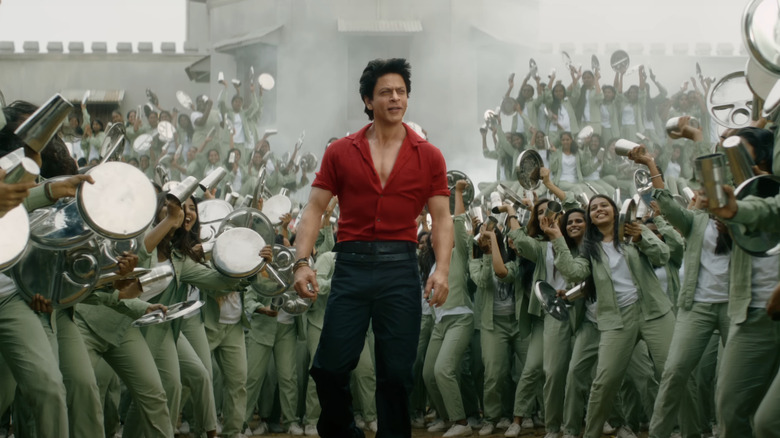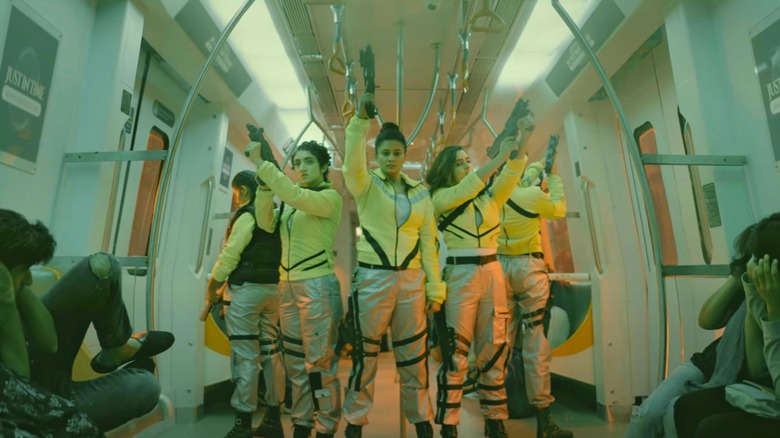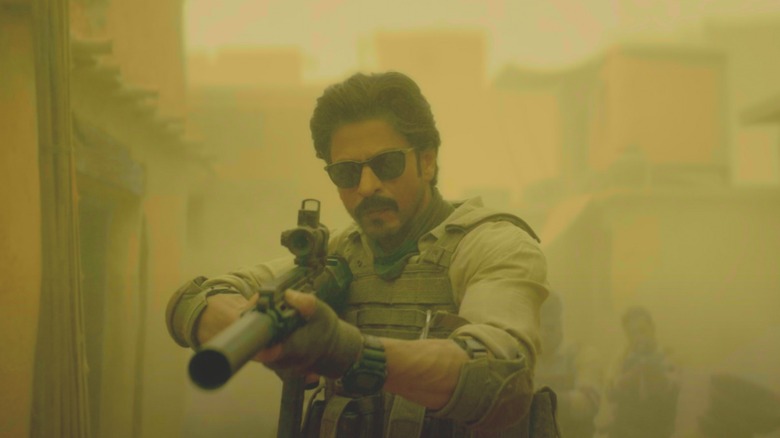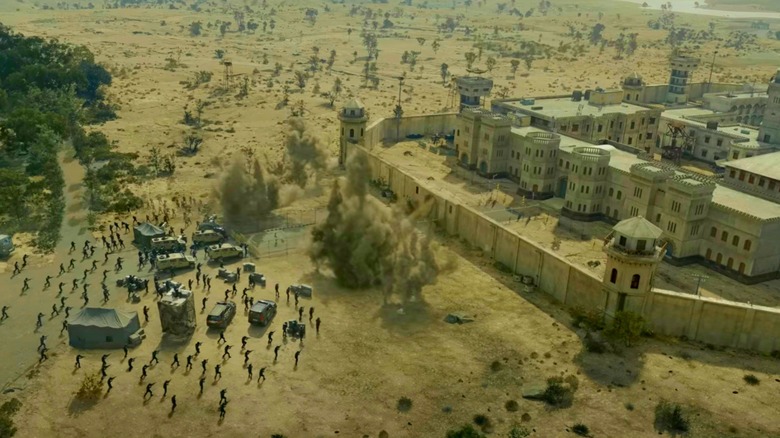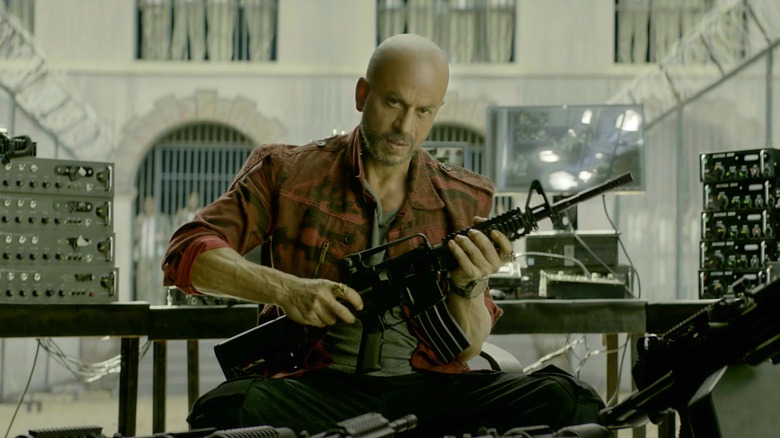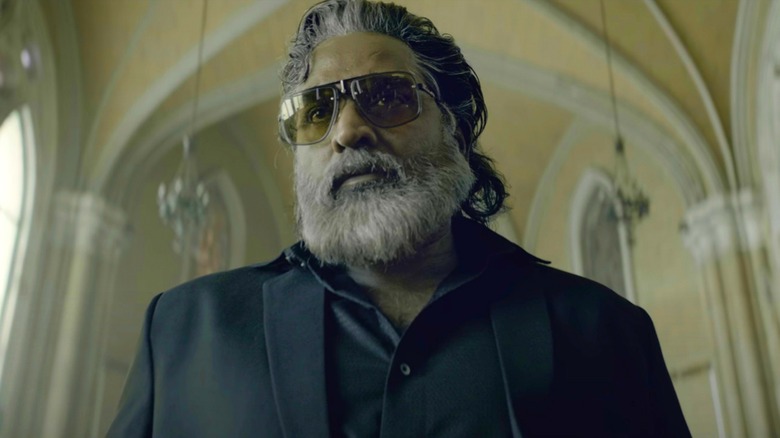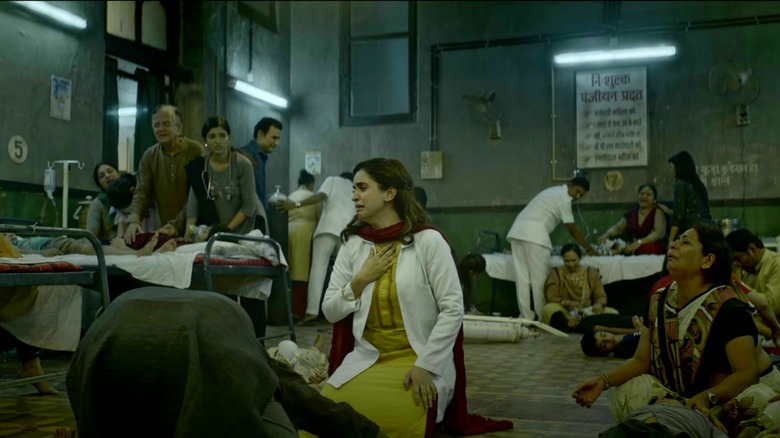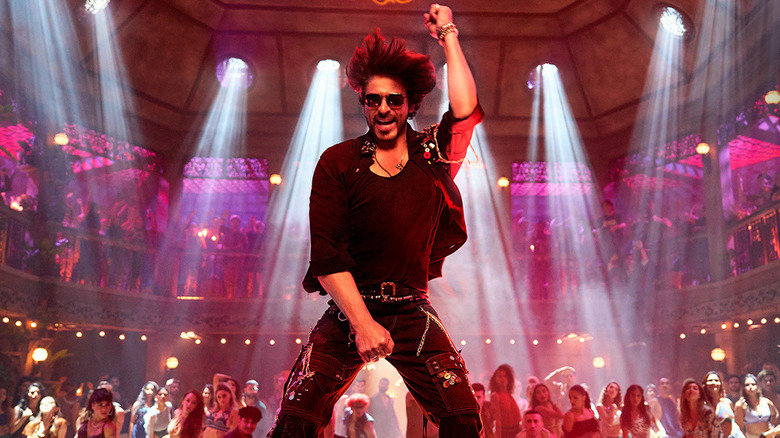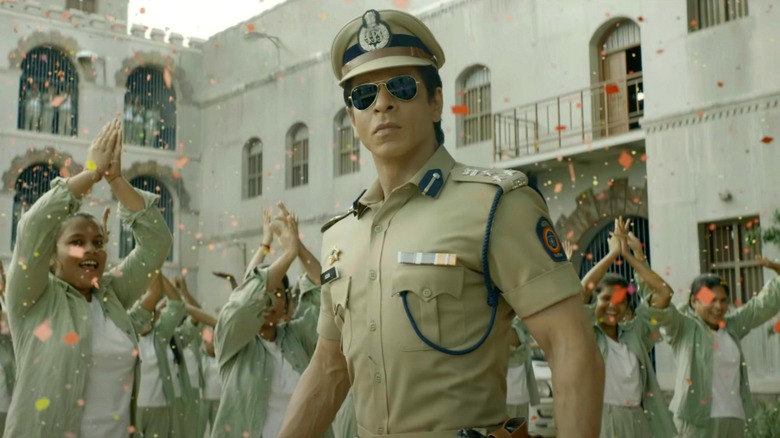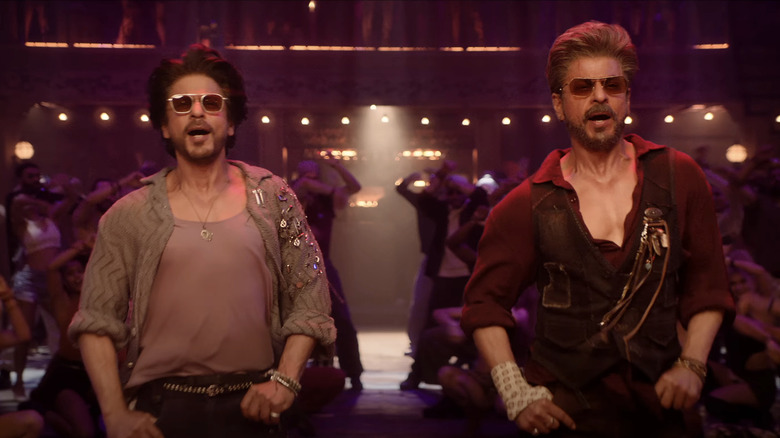The Ending Of Jawan Explained
After a successful career playing romantic leads and being crowned as the "King of Romance," Indian megastar Shah Rukh Khan has now cemented himself as an action star, having consecutively delivered two of 2023's biggest Indian blockbusters. Following a four-year hiatus from acting, the 57-year-old actor returned with spy-thriller "Pathaan" in January, which shattered Indian box office records and maintained its position as the number-one Indian film of 2023 — only to be dethroned in September by Khan's own "Jawan."
"Jawan" — meaning "Soldier" — created new records by raking in the highest opening weekend collection for a Hindi movie, as well as being the fastest Hindi movie to reach the highly coveted Rs.1000 crore ($120 million) mark globally. The film shows no signs of slowing down, and at one point entered the top 5 at the US box office.
As with many commercial Indian films, it's difficult to explain "Jawan" with a single premise, as it has several movies stuffed into one: a vigilante's endeavor to right the wrongs of society, a son uniting with his long-lost father (both played by Khan), the unlikely love story between a cop and crook, and an ex-soldier seeking revenge on a corrupt arms dealer for framing him as a terrorist.
"Jawan" balances several genres, story threads, and themes with a breakneck pace that could make it difficult for some audiences to comprehend amid its tonal whiplashes and plot convolutions. It's a savory blend of action, romance, drama, comedy, thrills, and social messaging — essentially all the herbs and spices that make for a classic "masala" movie in India. So, if you're left confused by the movie's twists and turns and its many real-life and meta references, we've got you covered. This is the ending of "Jawan," explained.
What you need to remember about the plot of Jawan
"Jawan" follows Azad (Shah Rukh Khan), the jailer of a women's prison, who teams up with six of his convicts to try and cure the ills of society. The gang — each member driven by their own tragedies — undertakes hostage and kidnapping missions involving high-profile individuals and uses media attention to raise concerns and awareness about a host of societal and political errors in India.
The gang hijacks a metro train in Mumbai, holding its passengers hostage in exchange for Rs.40,000 crores ($480 million). Their aim is for the money to be sent to 700,000 destitute farmers around the country, who are forced to bear the brunt of poor farming laws and unfair interest rates that drive them to take their own lives. Azad, posing as "Vikram Rathore," targets Kalee Gaikwad (Vijay Sethupathi), a wealthy and murderous weapons mogul, to fund the demanded amount, citing personal history between the two. The gang's next mission involves kidnapping India's Health Minister and keeping him hostage in exchange for better infrastructure for every state-run hospital in the country.
Their demands are met, which significantly improves the lives of millions of Indians, for whom "Vikram Rathore" has become a messiah. However, Azad's exploits put him in conflict with counter-terrorism agent Narmada Rai (Nayanthara), who is on the other end of the hostage negotiations and has narrowly failed to nab the gang. What complicates matters is that Azad and Narmada — unaware of Azad's role as "Vikram Rathore" — fall in love and get engaged. Narmada only unveils the truth after the two get married, but both are immediately kidnapped and tortured by Kalee's men. The real Vikram Rathore — revealed to be Azad's father — comes in to save his son.
But wait, there's more!
After going undercover as a convict in the women's prison, Narmada finds out the truth about Azad and Vikram from the gang. In 1986, Vikram Rathore was a decorated Captain of the Indian Army's Special Ops unit. After successfully completing a rescue-ops mission — even after his unit finds out that they've been handed faulty weapons — Vikram filed a complaint against the Indian Army's weapons supplier, Kalee. Summoned to the court, Kalee tried to strike a deal with Vikram but was denied and had his contract with the Indian Army terminated. An enraged Kalee sent his goons to attack Vikram and his wife Aishwarya (Deepika Padukone), kidnapping the former and seemingly killing him.
Vikram was framed as a national traitor, and Aishwarya was arrested and sentenced to death for killing two police officers on Kalee's payroll. However, Aishwarya was found to be pregnant, which postponed her death sentence until the child turned five. The child, Azad (whose name translates to "free"), was born in the women's prison and raised lovingly by Aishwarya and her fellow convicts. On Azad's fifth birthday, Aishwarya told him about his father — insisting that Azad prove his father's innocence when he grew up — after which Aishwarya was hanged.
In the present day, Narmada changes her allegiance after hearing the story. Meanwhile, Azad — now reunited with his father — finds out that Vikram survived Kalee's attacks and was found and rescued at a remote village, though he had lost his memory in the process. After a few skirmishes with Kalee's men, Azad finds out about Kalee's political ambitions, and Vikram — joined by his comrades from his former unit — commits to helping Azad in his quest to thwart Kalee's plan.
What happens at the end of Jawan
Azad's final plan is to hijack a fleet of Kalee's trucks, filled with money intended to fund Kalee's political career. During the heist, Vikram and his unit draw Kalee's men away from Azad and his gang, allowing them to escape. Kalee's goons capture Vikram's unit, after which Kalee finds out that Vikram is still alive.
Azad lures public attention by pretending to hold his prison hostage, along with a fleet's worth of Electronic Voting Machines (EVMs) that Narmada stole with Azad's gang. After negotiating officer Madhavan Naik (Sanjay Dutt) fails to capture Azad, Azad demands that the Head of State enforce the closure of over 200 factories polluting the air and water all over India, urging every citizen to use the power of their votes to hold their leaders more accountable.
Meanwhile, Kalee tortures Vikram and his unit into guiding him to a secret access into Azad's prison. There, Kalee and his goons overpower Azad and his gang, after which Kalee goes to kill Vikram. However, Kalee's pistol malfunctions in the same way Vikram's did several years back. The empty clicks of Kalee's pistol bring back Vikram's memories, and following an emotional reunion with Azad, the father-son duo overthrow Kalee and his men.
Kalee is forced onto the very gallows where Aishwarya was hanged, where he desperately pleads for his life, but to no avail. Kalee is hanged to death. An unspecified amount of time later, Azad, Vikram, Narmada, and the gang are seen vacationing in a picturesque city. Here, Madhavan Naik shows up, holding Azad at gunpoint, until it's revealed that Madhavan had helped Azad in executing his missions. The officer gives Azad his next target — Swiss banks — after which all our heroes celebrate their victory with a dance number.
What the ending of Jawan means
In "Jawan's" climax, Azad, directly addressing the entire nation through a live broadcast, delivers a monologue that urges every citizen to realize the power of their votes. He insists on voting not for any candidate's rhetorics on religion or caste, but for the actions proposed by them for the sake of the nation and its citizens' progress.
India, much like the US, has seen an increase in the political strife between the left and right in the past few years, one that heavily involves the topics of religion and nationalism. "Jawan" star Shah Rukh Khan has, for the most part, refrained from voicing his political opinions, as Muslim actors like himself have faced heavy backlash from the country's right-wing for doing the same. Many theorize that Khan communicates his politics through the themes explored in his movies, especially with "Pathaan" and "Jawan." Still, "Jawan" doesn't criticize or point fingers at any particular political party or the ruling government, but simply encourages its viewers to rise above divisive rhetorics for the sake of the nation's progress.
Audiences and reporters have noted that Azad delivering his soliloquy directly to the camera is an extension of Khan himself voicing his opinions, where the actor gets the center stage to impel his audiences — India's citizens — to demand more from their leaders. This carries a lot of significance in light of the upcoming general elections in India in 2024, for which several candidates will be lobbying for votes to be elected as the country's next Prime Minister.
Another possible explanation of the ending
"Jawan" conveys several social and political messages, as Azad attempts to light a fire under the government's butt to get them to take corrective action for the sake of its citizens. The film also employs an "eat the rich" narrative, where the uber-wealthy Kalee, who has acquired his success by unlawful and exploitative means, is made to fork out $480 million by Azad (the Robin Hood archetype) to be distributed to hundreds of thousands of impoverished farmers suffering from corporate debt restructuring.
Additionally, the ending of "Jawan" highlights the importance of safer and cleaner industrial practices, with Azad demanding the closure of several factories across India responsible for labor exploitation, injuries, and deaths, alongside polluting the surrounding air and water. Furthermore, the people enlisted to permanently lock the gates to the factories are shown to be former workers who've lost their limbs and loved ones to unsafe working conditions at the factories.
The film puts forth an emphasis on labor unions and better labor regulations enforced by the government. Per IndiaSpend, India reported over 1,000 factory-related deaths and 4,000 injuries between 2017 and 2020, though the site suggests those figures are probably underestimated as many events are frequently underreported.
Through Kalee's political ambitions, which involve using his powers to help his foreign donors attain cheap labor and land to build polluting factories, "Jawan" also touches upon the long history of international corporations exploiting cheap labor and weak environmental regulations in India, subjecting factory workers to demeaning working conditions and poor wages.
All the real-world parallels in Jawan
Each member of Azad's gang of vigilante convicts in "Jawan" is driven by tragic backstories that involve being vilified by society and wrongly imprisoned. Many audiences in India noted how the fictional stories of these characters were paralleled by grim real-life events in the country's history.
In the film, Kalki (Lehar Khan), a farmer's daughter, sees her father being harassed for unpaid loans due to bad crops, after which he is pushed to take his own life. Despite India being an agrarian country, the country has faced rampant suicide rates of farmers for several decades, due to unhelpful governmental policies and mounting debts with abnormally high interest rates.
Dr. Eeram's (Sanya Malhotra) story of facing bottlenecks in oxygen supply and later being framed for the deaths of several children, is nearly a beat-for-beat recollection of Dr. Kafeel Khan's story in the 2017 Gorakhpur hospital tragedy, as detailed The Wire. After the release of "Jawan," Dr. Kafeel Khan posted a video on X, formerly known as Twitter, where he thanked Shah Rukh Khan and director Atlee for raising awareness of his story through the film, and stated that the real culprits have yet to be punished.
The scandal surrounding faulty weaponry supplied by arms dealer Kalee to the Indian Army in "Jawan" mirrors similar real-life controversies regarding corruption and negligence in the quality of weapons supplied to Indian Army soldiers. Namely, the 1986 Bofors scandal, which uncovered deep government-level corruption and bribery in awarding weapons supply contracts to arms manufacturer AB Bofors, and a 2015 Delhi High Court inquiry into a petition claiming that Indian soldiers were forced to use inferior weapons even at the risk of death due to bureaucratic obstacles from authorities.
If you or someone you know is struggling or in crisis, help is available. Call or text 988 or chat 988lifeline.org
Jawan's many meta references
While commercial Indian movies don't outright break the fourth wall, they don't hesitate to drill small holes in it to add meta references and throwbacks to its stars, their iconic roles, and dialogues. It's one of the elements that make a movie a "mass entertainer" for audiences, as these references become an incredibly satisfying payoff for fans who've been following an actor's career for decades. "Jawan" is replete with references to Shah Rukh Khan's persona as "King Khan," his roles, and oft-quoted dialogue from his thirty-plus years of stardom.
At the film's midpoint, upon rescuing Azad, Vikram is asked for his name by Kalee's henchman and tells him, "Rathore. Vikram Rathore. Naam toh suna hoga (You know my name)," a reference to Vikram's name reaching public notoriety. The line also serves as a call-back to Khan's iconic dialogue from his 1997 rom-com "Dil To Pagal Hai" ("The Heart is Crazy").
When Kalee is confused by seeing Vikram's doppelgänger live on television while holding Vikram hostage, Vikram's cohort tells Kalee, "He [Azad] is Simba, this [Vikram] is Mufasa," a subtle reference to Khan and his son Aryan voicing the father-son duo in the Hindi dub of 2019's "The Lion King."
The most talked-about reference is Vikram's dialogue in the film's climax, translating to "Before you touch my son, deal with his father," which he tells Kalee when the latter is about to attack Vikram's son Azad. Aside from the sentiments of a protective father, the line carries more meta weight for Indian audiences who are familiar with the unlawful arrest of Khan's son Aryan — relating to possession of drugs in October 2021 — which was a major media frenzy at the time.
How audiences reacted to the ending
With the film's box office numbers and impressive scores on Rotten Tomatoes, it's safe to say that "Jawan" was everything that fans of Shah Rukh Khan and director Atlee were hoping for and much more. In addition to the film's breathtaking action sequences, political messaging, and Khan's crowd-pleasing persona, Azad's passionate monologue at the film's climax impressed fans and critics alike.
On X, @KELVlN_FILTER wrote, "That speech SRK gives near the tail end of Jawan feels like something that could actually inspire and enact change when you're watching it, that star power is crazy." Similarly, @shreemiverma said, "The best part about Shah Rukh's scene in Jawan where he asks people to use their brains before casting their vote is that neither side of the political spectrum can openly take offense to his speech. The ones who do get mad inadvertently admit to being, well, incompetent."
Film critic Anupama Chopra said in her review of the film, "There is such urgency and such emotion in Shahrukh's voice, that even if at the end of it he had declared he was standing for elections, I would have cheered."
What does the ending mean for a potential sequel
The ending of "Jawan" has a throwaway tease for where its sequel could go, indicating a possible target of Swiss Banks holding "black money" (finances obtained either illegally or not reported for tax purposes) of India's wealthiest elite. Having achieved infamy in India, targeting the illegal wealth of Indian citizens kept in off-shore accounts seems like the best way for Azad and his gang to spread their vigilante notoriety across the world.
It would also be interesting to see how having a former cop, Narmada, in their midst would shape group dynamics and influence the way they carry out their missions going forward — similar to the romance arc between Inspector Raquel Murillo (Itziar Ituño) and The Professor (Álvaro Morte) in Netflix's "Money Heist," where the two were on opposing sides of the law before falling in love and carrying out heists together.
While writer-director Atlee showed interest in making a sequel and a possible spin-off focusing on Vikram Rathore, the filmmaker admitted in an interview with Pinkvilla that all his films have an open end, but he's never thought of doing a sequel to any of them as of yet. "For 'Jawan,' if anything strong comes to me, I will make a part two. I have kept an open end and I can come up with a sequel now or later. But definitely will come up with a sequel to 'Jawan' one day."
